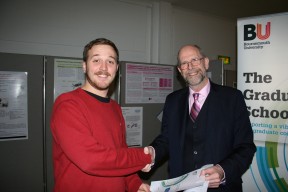Bournemouth University student Norman Gregory, currently reading for a Master’s Degree in Film, has been in Tuscany directing his first feature film ‘A Reason to Leave’.
Film and Television stars Claire King (Emmerdale, Footballer’s Wives) and Mark Wingett (The Bill) take the leading roles in Gregory’s directorial debut. Cast and crew recently completed a fortnight of filming in Dorset, and have travelled to Tuscany for two more weeks of filming – with the film set between both locations.
Originally an actor, Gregory has decided to pursue a career in directing. He chose BU to complete his Masters in Film, as he believed the degree is the ‘best in the country for directing’. ‘A Reason to Leave’ is a part of Gregory’s final project.
The film, described as a ‘tragic redemption’, follows mother and daughter Sarah (King) and Bethany (played by Alice Bird) as they emigrate to Tuscany, and their involvement with Harry Webster (Wingett). Their reasons for their relocation are revealed as the film progresses.
The script was co-written by Gregory and BU Scriptwriting Master’s student James Cottle. Gregory lauded the strength of the script, which attracted King and Wingett. He said: “This is a really exciting project and I am delighted that Claire, Mark and Alice are playing the leads together with Simone Spinazza who joined us in Tuscany. They are all highly respected and established actors and are taking the film to another level. We have a wonderful script, co-written by James Cottle who is on the BU Scriptwriters Master’s course, the strength of which enabled us to attract Claire and Mark.”
A number of BU Master’s students have also had the opportunity to work on the film as crew members, providing vital experience as they finish their degrees.
Gregory’s tutor, Subject Leader in Film and Television Trevor Hearing, is expecting a positive response for ‘A Reason to Leave’.
Trevor Hearing said, “Norman’s debut feature film is the latest in a line of feature films to have come from graduates of Bournemouth University’s Media School in the past few years and this film looks to be just as successful. It is emotionally gripping story-telling at its best, with a recognisable cast who deliver powerful performances. Norman has drawn on his own acting career to get the best from his actors and he has delivered them a script which gives them a lot to work with. The film shows a distinctive directorial voice, combined with international locations and outstanding camerawork from a world class cinematographer. I am confident this is a film which will be talked about.”
Picture: Cast and crew on set in Tuscany, including Norman Gregory, Claire King and a number of BU students.
By Harriet Gilbraith
Harriet is a student at Budmouth College in Weymouth, who is working at Bournemouth University in the Press and PR Department. She joined BU on a Sir Samuel Mico Scholarship, which provides 10 students from the college with work experience for four weeks over the summer.
 Bournemouth University
Bournemouth University